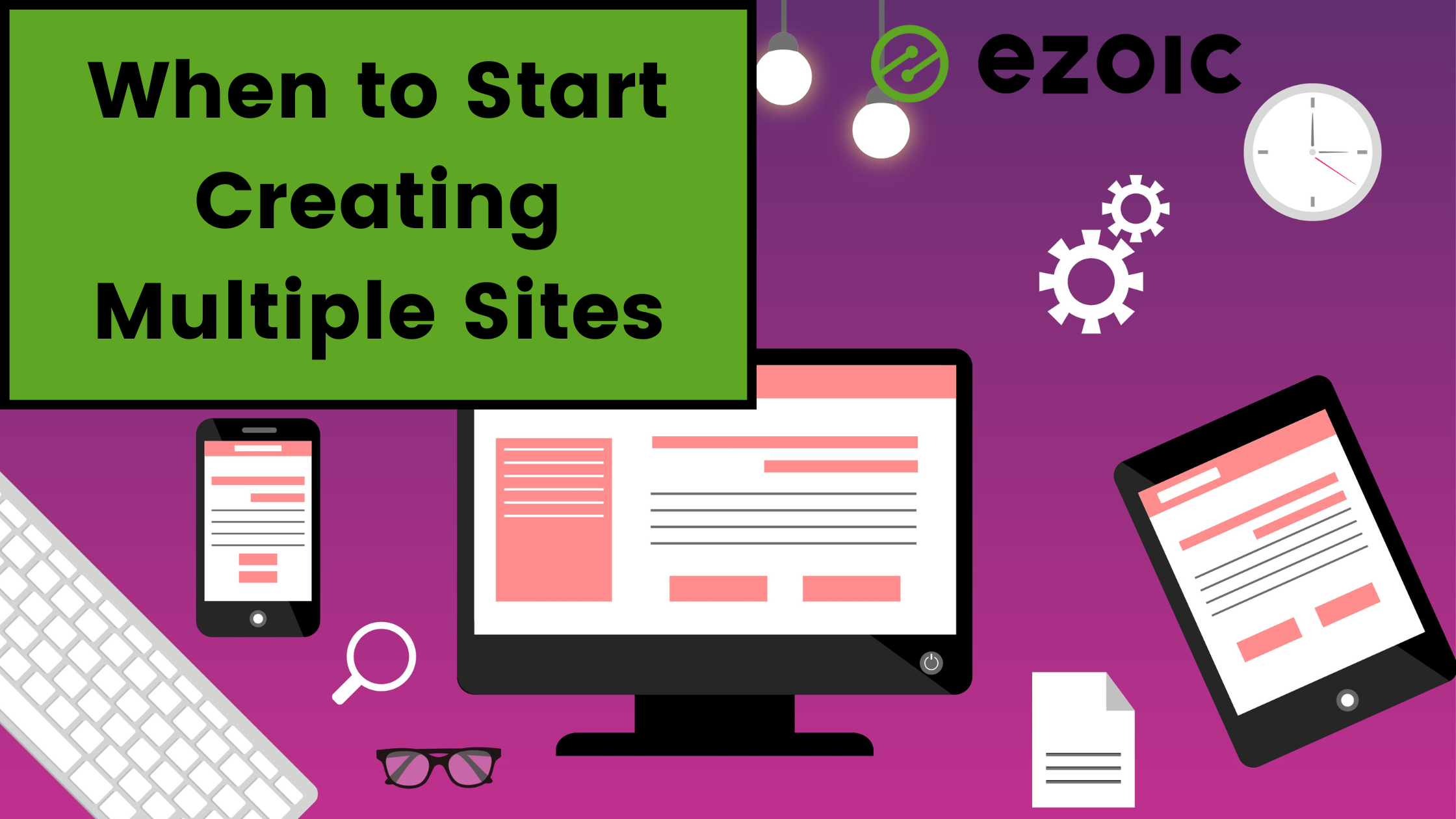
Which Gives You More Revenue: Creating Multiple Sites, or Expanding Your Current Site?

Get helpful updates in your inbox
When a publisher is starting to see success with their site, it’s natural for them to ask the question:
Should I make a new site?
It’s understandable; if you start creating multiple sites and they work out, that could mean double the revenue, double the traffic, and double the success with each new site you make!
If you can make multiple successful sites, it’s true you can see exponential growth in your traffic, revenue, and influence. The skills you learn from building one successful site can be used to build more. Digital website product builder Colibri recently reported that new sites with healthy traffic can earn on average several thousand dollars a month through ad revenue, affiliate networks, and more. You can reinvest the profits of one site back into your network of sites, spreading the wealth to help grow each individual site.
But this process can be fraught with difficulty, and is highly dependent on your resources you can afford to put into these sites. Each site is a bit like a restaurant franchise location; each site needs its own managers, coordinators, and workers to keep it running. If you run a successful restaurant and decide to open a second location, it will almost certainly fail unless you double your workforce and pour as much resources into the second location as you do the first.
This article will help you understand what it takes to create multiple successful websites, avoid common mistakes along the way, and make informed decisions about the setup of your website strategy.

You’ll Need Four Key Resources Before You Should Start Creating Multiple Sites
Before you start a new site while you are currently maintaining a growing site, you should really have four major resources:
- The ability to write content
- Money
- Time (at least six months)
- SEO expertise
First, and by far the most important — you need to be able to publish content. Great content. If you can’t create it yourself, or you aren’t able to have other content creators publish content for you, you probably shouldn’t make a new site. Without consistently producing high-quality content, a site can’t survive.
If you are the sole or primary content creator for your current site (if you don’t create content, no one will), you probably shouldn’t make a new site. Why? Because right now, you are the engine of your site; it runs on you producing content. Once that content stops, or the quality drops, the site will probably begin to fail.
Next, you need money (shocker!). There’s a plethora of financial investments you need to make for a successful site — buying a domain, hosting fees, web tools, hiring freelancers, etc. If you don’t have consistent income coming in you can fully dedicate to your current and new site, you should probably wait to make a new site until you have that income.
The third resource is the most scarce — time. If you are not able to commit a good three (but ideally six) months of time to this new endeavor, you probably shouldn’t make a new site.
Why? Because building these sites takes time. Even if you’re publishing stellar content with good potential for high SEO rankings, Google and other search engines usually require at least a couple months to really examine your content before they’ll begin ranking it highly in search engine results. If you publish content for two months and see no results, that’s not necessarily because it’s bad content — you just need to let Google and your audience take time to find you. If you quit before that happens, your site never even had a chance in the first place.
Lastly is SEO expertise. Every great site that’s performed well for a long time almost always has top-tier search engine optimization present on the site, site content, and brand. Without great SEO, your audience will have a much harder time finding you and your content.
If you’re still figuring SEO out, Ezoic has a mountain of resources and tools to help, including our Tag Tester tool, our official SEO eBook, and a host of interviews, blogs, and trainings you can view right now.
Once you have all four of these resources, you’re ready to start the process of creating a new site.
A New Site is Like a New Restaurant Location. You Need to Serve Customers in Both Locations.
Every niche has thousands, perhaps millions of active publishers creating content about that topic. Audiences always have a choice on where they spend their time online. If you can’t give your audience what it wants, they’ll simply go somewhere else and provide ad revenue for other publishers.
Think about building a new site like building a second location for your successful restaurant. Any customers will expect the same level of service and quality from both. If your second location isn’t up to par, you won’t get customers (or at least return customers). You should only build a new site when you have enough resources to make your new site just as active as your first one.
Don’t fall for “shiny object syndrome,” where the thought of a new site is so overpowering you fully commit without thinking it through. Successful sites are built through consistently publishing quality content. If you can’t provide that, you’re probably better off just continuing to further build your current site.
When you’re building a new site, you don’t have to do everything all at once — you can plan it out, and strategically position yourself to post content at times and places that work for you. You don’t need to be extremely active on several social platforms; find the one you like and stick with it.

Creating Multiple Sites Is Part of the Process of Evolving From Content Creator to Owner
When you first start out as a publisher, odds are you’re the one doing everything — writing the content, editing it, setting up web tools, posting on social media, responding to messages, etc. It’s a lot of work, and can easily take up all the time in your days.
But by successfully creating new sites, you can eventually graduate from content creator to site “owner,” where you remove yourself from the equation and let others manage all this site work for you. This takes time, and requires an entirely different skill set. It involves hiring other professionals to run your site or sites for you, allowing you to earn income while your team does most of the work for you.
Owning a site is a bit like making an investment in a company: you pay for all the expenses and workers, but you also get all the profits and revenue that company earns. It’s the difference between the coach of a sports team and the team owner. The coach is waking up early with their team, working out, planning game strategy, etc. On the other hand, the team owner is behind the scenes, paying the bills but also reaping the profits.
You can still earn enormous revenue as a content creator, and keep creating content you love that your audience appreciates. But successfully creating new sites is a strategy that can help you truly own your site content, stepping in when you’d like but ultimately having your team run the operation for you.
The Hard Truth About Making an Entirely New Site
If you decide to create a new site about an entirely different topic from your current successful site, here’s one of the hardest truths you’ll experience:
Most of your current audience probably won’t also be active on your new site.
Your current audience followed you and your current site because it was the kind of content they wanted. As much as they like you, as much rapport as you’ve built with that audience…it’s unlikely a large portion of your audience will be interested in your new topic because that’s not what drew them to you in the first place.
Here’s a story about what I mean.
As a long-time video game fan, I follow several different content creators about video games. I like content about tutorials, video game analysis, training strategies, and so on.
One content creator had a channel all about how to get better at certain video games. It was very successful, with nearly 100,000 subscribers and millions of views. But one day, he announced to his channel that he had lost his passion for video games, and was transforming his channel into an entirely different one: a channel all about stocks, investing, and finances.
It was fascinating to see his audience’s reaction. Many of them (including me) were happy for him, and wished him well on his journey. We thanked him for the content we enjoyed, and hoped his new path would be fruitful. Some of us even expressed interest in following him with his new passion, and tuned in for his videos on investing and finances.
His first video about this new topic had a decent amount of views. But over a few months, his views plummeted. The more he posted, the less views he received. His last videos were receiving a paltry few hundred views.
He stopped posting, and hasn’t made any new content in over a year.
Perhaps he could’ve made an entirely new channel and invited his audience base to also follow there. But in the end, his rebranded channel died, and his audience left.
Even if you’ve built a large audience base, the odds of transferring that audience to your new topic are low. That’s OK, and it’s just part of the process. It’s a difficult truth, but if you want to make a new site, you usually have to start from the very bottom again.

In Conclusion
Many Ezoic publishers have gone on to build or buy new sites, turning them into a lucrative investment and exponentially multiplying their success. Other publishers have invested everything they have into their one main site, and have built a 6 or even 7-figure business through that site alone. There is no wrong answer for this strategy; the wisdom lies in understanding your current motivation, resources, and plan.
Building a new site requires different skills than maintaining or growing an existing site; if you spread yourself and your resources too thin, you can risk the entire operation falling apart.
Still, there’s enormous revenue in creating new sites. If this is the path you want to take, organize your resources, commit to working for months, and move towards eventually owning your site with a team that helps with the important work.

Anthony Moore is a writer, speaker, and coach. He's helped hundreds of entrepreneurs create successful businesses, and has gained over 7 million views for his work on entrepreneurship, personal growth, and productivity.
Featured Content
Checkout this popular and trending content

Ranking In Universal Search Results: Video Is The Secret
See how Flickify can become the ultimate SEO hack for sites missing out on rankings because of a lack of video.
Announcement

Ezoic Edge: The Fastest Way To Load Pages. Period.
Ezoic announces an industry-first edge content delivery network for websites and creators; bringing the fastest pages on the web to Ezoic publishers.
Launch

Ezoic Unveils New Enterprise Program: Empowering Creators to Scale and Succeed
Ezoic recently announced a higher level designed for publishers that have reached that ultimate stage of growth. See what it means for Ezoic users.
Announcement
